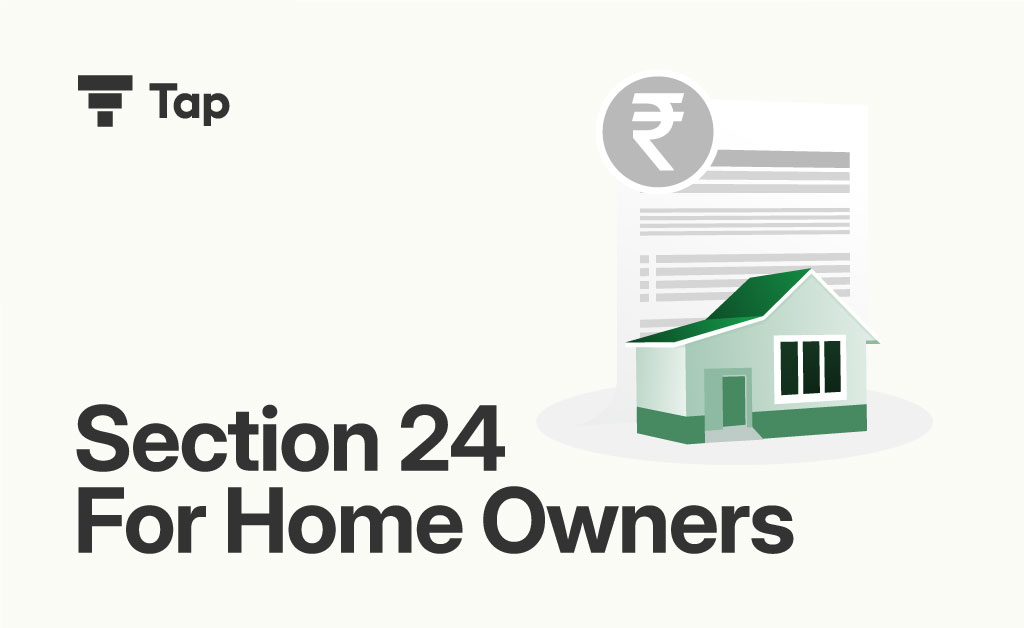Tax Benefits Under Section 24(b) of Income Tax Act

Section 24 of Income Tax Act:
The Indian Income Tax Act provides several provisions for taxpayers to reduce their taxable income, including Section 24. This section deals with deductions from the revenue earned from house property. Specifically, it allows taxpayers to claim deductions on interest paid on home loans and a standard deduction for repairs and maintenance. This article explores the intricacies of Section 24, including its subsections and the conditions under which these deductions can be claimed.
Key Features of Section 24:
- Standard Deduction (Section 24(a)): This allows a flat deduction of 30% of the net annual value of the property for repairs and maintenance, irrespective of the actual expenditure incurred by the owner.
- Interest on Borrowed Capital (Section 24(b)): This provides for the deduction of interest paid on loans taken for the acquisition, construction, repair, renewal, or reconstruction of a property. The deduction amount varies based on whether the property is self-occupied or let out.
Section 24(a): Standard Deduction:
The standard deduction under Section 24(a) applies to all properties, whether self-occupied or let out. It allows a deduction of 30% of the net annual value (NAV) of the property, calculated after subtracting municipal taxes from the gross annual value (GAV). This deduction is granted to cover costs related to property maintenance, including repairs and renovation.
Section 24(b) of the Income Tax Act: Interest on Borrowed Capital
Section 24(b) of the Income Tax Act provides tax relief on the interest paid on home loans. The deduction amount depends on the property type and the loan’s purpose.
Self-Occupied Property:
For self-owned house properties, the maximum deduction allowed is ₹2,00,000 per annum, provided the loan is taken for the purchase or construction of a new property. The building or acquisition should be completed within five years from the end of the financial year in which the loan was taken. If this condition is not met, the deduction limit is reduced to ₹30,000 per annum.
Let-Out Property:
For let-out properties, there is no upper limit on the deduction for interest paid on the home loan. This means the entire interest amount paid during the financial year can be deducted from the property’s income, significantly reducing the taxable income.
Pre-Construction Period Interest:
Interest paid during the pre-construction period is also eligible for deduction. However, this interest can only be claimed in five equal instalments from when the construction is completed or the property is acquired. The total deduction, including pre-construction interest, cannot exceed the limits for self-occupied or let-out properties.
Tax Deduction on Home Loan Interest Section 24:
The tax deduction on home loan interest under Section 24 provides substantial tax benefits for homeowners. However, it is crucial to understand that this deduction applies only to the interest component of the home loan, not the principal repayment, which can be claimed under Section 80C of the Income Tax Act.
Additionally, first-time homebuyers can benefit from an extra deduction under Section 80EE, provided certain conditions are met. This additional deduction is capped at ₹50,000 per annum for interest on loans sanctioned between April 1, 2016, and March 31, 2017.
FAQs on Section 24 of the Income Tax Act:
- What is the maximum deduction for self-occupied properties under Section 24(b)?
- The maximum deduction for self-occupied properties is ₹2,00,000 per annum, provided the construction is completed within five years. Otherwise, it is limited to ₹30,000.
- Can I claim a deduction for a home loan taken for renovation under Section 24(b)?
- Yes, under Section 24 (b), you can claim a deduction for interest paid on a home loan taken for renovation, repair, or reconstruction.
- Is the standard deduction under Section 24(a) available for self-occupied and let-out properties?
- Yes, the standard deduction of 30% of the net annual value is available for self-occupied and let-out properties.
- How is the deduction for pre-construction period interest calculated?
- The interest paid during the pre-construction period can be claimed in five equal instalments, starting from the year the construction is completed or the property is acquired.
- What happens if the house remains vacant?
- If the property is let out but remains vacant, the expected rental income will still be considered for tax purposes, and deductions under Section 24 can be claimed accordingly.
Conclusion:
Section 24 of the Income Tax Act offers significant tax relief for homeowners by allowing deductions on home loan interest and maintenance expenses. By understanding the provisions of Section 24, taxpayers can minimise their tax liabilities and maximise their savings. Whether the standard deduction or the interest deduction under Section 24(b), these provisions are crucial for managing tax liabilities related to property income.
Getting a home loan is easier nowadays, but paying interest with just a single income or salary can be challenging. To live stress-free, consider multiple income sources. Fixed income securities can provide alternative income. Sign up on TapInvest today and start investing!
